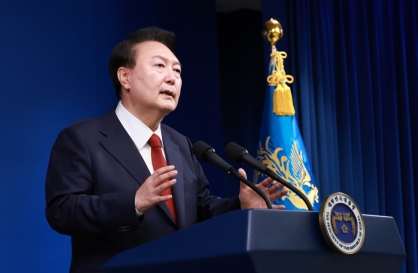Seoul rolls out job creation plan
Employment road map highlights supports for working mothers, SMEs
By Korea HeraldPublished : June 4, 2013 - 21:09
The government said Tuesday it aims to create more than 2.38 million jobs by 2017 through flexible hiring, reduced work hours, job sharing and more positions for youth, women and the elderly.
The Prime Minister’s Office announced a road map to deliver President Park Geun-hye’s pledge to raise the employment rate to 70 percent. The percentage stood at 64.2 percent last year.
The plan involving 13 ministries and agencies came as Park, marking her 100th day in office, is accelerating her policy drive to boost welfare, growth and market fairness. Her government plans to unveil on Wednesday a set of plans on nurturing creative industries.
Prime Minister Chung Hong-won stressed that the nation’s export-driven economy as well as social acceptance of long working hours for men have weakened the market’s capacity to create new jobs.
“To achieve the goal of boosting the employment rate to 70 percent, (the government) will fundamentally change the current job creation system,” Chung said.
The Prime Minister’s Office announced a road map to deliver President Park Geun-hye’s pledge to raise the employment rate to 70 percent. The percentage stood at 64.2 percent last year.
The plan involving 13 ministries and agencies came as Park, marking her 100th day in office, is accelerating her policy drive to boost welfare, growth and market fairness. Her government plans to unveil on Wednesday a set of plans on nurturing creative industries.
Prime Minister Chung Hong-won stressed that the nation’s export-driven economy as well as social acceptance of long working hours for men have weakened the market’s capacity to create new jobs.
“To achieve the goal of boosting the employment rate to 70 percent, (the government) will fundamentally change the current job creation system,” Chung said.

“For this, we need to change the labor market led by male workers, manufacturers and big companies, and create a new environment where everyone can take on flexible types of work and take care of their families at the same time,” he said.
The prime minister also urged the labor groups and businesses to closely cooperate in the government’s initiatives.
To this end, the government plans to create about 930,000 part-time jobs, especially for women, youth and seniors and to increase institutional and financial support for small and medium-sized companies.
Ministries have brought up a total of 137 projects to be implemented over the next five years.
Calls for better child care service and flexible working hours for mothers have been growing as many quit work over unfavorable conditions. The nation’s employment rates of women and the youth lag behind the average figures of OECD member countries. With new labor policies, the government expects to increase the employment rate for women from the current 53.5 percent to 61.9 percent and from 40.4 percent to 47.7 percent for youth.
The government plans to expand part-time jobs for them so that they can better balance between work and home. Full-time working mothers can request companies to reduce their work hours for a year; additionally, mothers with kids aged 9 and under will be permitted to take partly paid maternity leave for a year. The limit is currently for kids up to age 6.
Companies that open more part-time positions will get tax incentives and state subsidies. Regulations on workplace nurseries will be eased and support funds will be provided for companies hiring part-timers to replace their employees who are on child care leave, officials said. A new labor law will be legislated to protect the rights of part-timers as well, they added.
The government also plans to create 250,000 social service jobs for women.
On youth employment, Seoul will launch an apprenticeship system for young jobseekers so that they can learn and work at the same time instead of wasting time and resources on job searching. A pan-governmental task force team will be launched to encourage graduates to find jobs at SMEs, which have been suffering from a lack of quality workers.
For the planned extension of the retirement age to 60, the government will urge elderly workers aged 50 and above to gradually reduce their working hours and eventually cut their salary. They will be given a support system to help them find jobs after they retire at age 60.
The government also plans to gradually reduce annual working hours per worker from the current 2,090 to 1,900 in the next five years.
In 2010, Korean laborers worked 2,193 hours on average, more than 400 hours longer than the OECD average of 1,749 hours.
To shorten Korea’s notoriously long working hours, the government said working hours on weekends or holidays will be recognized as extended work hours and companies will be urged to financially compensate for unused annual leave.
By Cho Chung-un (christory@heraldcorp.com)
-
Articles by Korea Herald









![[K-pop’s dilemma] Time, profit pressures work against originality](http://res.heraldm.com/phpwas/restmb_idxmake.php?idx=644&simg=/content/image/2024/05/08/20240508050705_0.jpg&u=20240508171126)









![[Today’s K-pop] Stray Kids to drop new album in July: report](http://res.heraldm.com/phpwas/restmb_idxmake.php?idx=642&simg=/content/image/2024/05/09/20240509050659_0.jpg&u=)